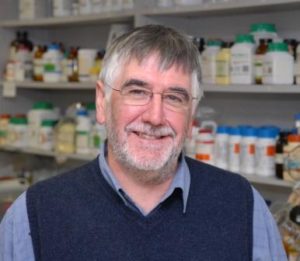
Flinders University’s new integrated waste treatment and algae growing system at Roseworthy Piggery, north of Adelaide, aims to make pork production more sustainable and reduce the industry’s greenhouse gas emissions.
The Cooperative Research Centre for High Integrity Australian Pork (Pork CRC) has invested in the project so that researchers from the School of the Environment at Flinders can establish a working research version of a system that will improve treatment of piggery waste, while allowing creation of an algal biomass that can contribute to alternative energy generation.
Professor Howard Fallowfield said the project flows from a Flinders review commissioned by Pork CRC that evaluated several different strategies with potential to radically decrease the carbon footprint of pork production.
“What we’ve identified for the industry is an integrated system that comprises existing covered anaerobic ponds which produce methane from pig waste, an aerobic treatment system to detoxify ammonia and an algal pond to grow algae,” Professor Fallowfield said.
“Effluent treated in anaerobic ponds has a very high ammonia concentration that prevents the growth of algae. With the benefit of expert advice from Associate Professor Ivo Svoboda in Europe, we are using aerobic treatment to oxidise the ammonia to nitrate, thereby removing the toxicity and allowing the growth of algae in the system.”
While one strategy considered the possibility of using the algae as a food source for pigs, the potential for recycling disease meant that using the algae as an energy source became the preferred option.
“The algal biomass will go back into the anaerobic pond to produce more methane. Combined with methane produced from the slurry, this extra methane will be fed into combined heat and power systems, reducing dependency on fossil fuel for piggery operations,” Professor Fallowfield said.
“They will be using their own stationary energy produced on site.”
As a bonus, Professor Fallowfield said the system produces much higher quality water for reuse in piggery operations.
“The industry already uses the reclaimed water to wash down the pigpens and to flush away the slurry – what we believe is that the lower levels of ammonia and bacteria will maximise pig health and reduce the cost of pork production,” he said.
“You get an environmental benefit and an economic benefit.”
As well as setting up the pilot system with industry partner Roseworthy Piggery, the Pork CRC project will support two years of work on the project by Dr Neil Buchannan, a post-doctoral researcher at Flinders.
The project is part of Pork CRC’s Program 4, ‘Carbon Conscious Nutrient Inputs and Outputs’.

